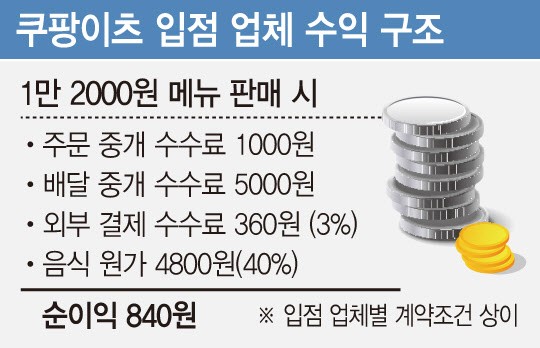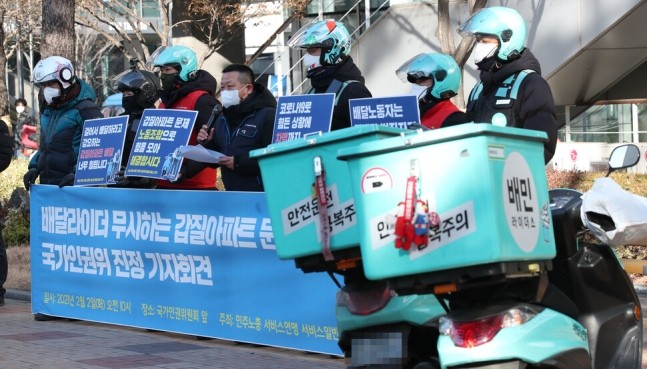Since Covid-19 dissuaded people from visiting restaurants, consumers turned to delivery services to get their prepared meal services. Compared to the winter of 2019, the usage of food delivery services surged by 83% in the winter of 2020. The social distancing restrictions have also increased the number of businesses preparing food for home delivery. However, pressure from increased food delivery demand has revealed shortcomings in the existing system. Delivery apps that people frequently use have imposed excessive fees on businesses for their use. In addition, drivers are often burdened with a heavy delivery workload while at the same time being unfairly treated by ignorant customers.
The delivery service industry in Korea can be traced back to the Joseon Dynasty. The method of delivery has evolved from walking to bicycle delivery to motorcycle and car and truck delivery. With the proliferation of smartphones, the first food delivery apps, ‘Baedal Tong’ and ‘Baemin’ we launched in Korea. Users were happy to have a choice of ordering different kinds of food without having to leave home. Single-person households, who cannot be bothered to cook for themselves, welcomed the new delivery service options. With increased demand for non-contact food delivery services, transport businesses have also launched cooperative ventures with telecommunications companies diversifying their businesses. Robots are now serving customers in restaurants and delivering room service in hotels. Baemin launched their robot room service delivery with a device called ‘Dili Tower.’ After scanning service items or food from a list of QR codes provided in each room, people can pay electronically and ‘Dili Tower’ delivers the order to their hotel room. You are notified by phone when your order is at your door. Dili Tower has also been used to replace some in-room minibars. By putting the robot in charge of charge of delivery services, employees can focus on other guest comforts and improve the overall quality of the service to the consumer. While these innovative new delivery services provide much convenience for our lives, several problems have begun to emerge.
On January 28, Coupang Eats announced that the order brokerage fees, card fees, and delivery charges will increase within the first half of the year. In the early days of the service, Coupang Eats paid most of the costs to increase its share of the market and the number of users. As the delivery business grew rapidly, it began to shift the burden of costs to merchants. They adjusted their basic brokerage fee from 2,000 won to 15 percent of the order amount. Currently, Coupang Eats has a basic delivery fee of 2,000 won, but many stores are charging 1,000 won to promote their business. Those who are mostly impacted by the planned fee increase are mainly independent small businesses who signed on with the company when it first launched in September 2019. Although the terms of the contract varied from store to store, many received free delivery charges if they exceeded a certain order amount. Coupang Eats claims they took on the burden of delivery charges to increase its share in the delivery app market, which was already dominated by Baemin and Yogiyo. However, they say, the time to face the reality of costs incurred has come. Business owners have been taken aback by the sudden notice of prices changes by Coupang Eats. A self-employed businessman who runs a franchise pizza restaurant in Seoul expressed anger over the plan saying, he was told, "If you don't agree to the new fee structure, you can terminate our service contract." Independent businessmen worry that Coupang Eats could raise its basic commission rate to 15 percent if its market share continues to rise. Coupang Eats said, "The reorganization of the commission system is aimed at enhancing equity, by unifying the commission system of all our stores." Adding, "We will sequentially switch to a new commission system introduced with the individual consent of our contractors."
 |
| ▲ Revenue structure of companies entering Coupang Eats. (Photo from E-Daily) |
To address rising costs, some local governments began developing public food delivery applications as a solution. ‘Baedal Teukgeup’, developed by Gyeonggi-do is one of those services. According to an official at Gyeonggido province, the goal of this service is to develop a fair marketplace and help small business owners secure their part of the market. Contrary to private companies charging high brokerage of 6~13 percent, Baedal Teukgeup charges a 2 percent commission. It is estimated that securing 39,000 stores will save more than 560 billion won in operating expenses annually. The application is off to a good start, recording 110,000 members and aggregating a turnover of 3 billion won a month since its launch in January.
The problems with the delivery service are not only related to fees. The increase in demand for delivery services has led to heavy workloads for drivers and there are not enough drivers to meet demand. This results in delivery service delays. While the increase in demand has impacted delivery times, so has the weather. Last winter, delivery services were interrupted due to heavy snowfalls. Compounding the issues of workload and pressure from timely delivery service requirements, is the unfair treatment of drivers by customers. An employee at a language academy in Seoul told one driver, "You didn’t study hard, so you ended up being a deliveryman." Furthermore, in apartments in Gangnam and Seocho, drivers must use cargo lifts. Motorbikes are also not allowed on some apartment properties, which has led to protests by drivers. At a press conference hosted by the delivery driver's union, members submitted a petition to the National Human Rights Commission citing the management offices of a total of 83 buildings, including 76 apartments and seven buildings for poor treatment of their members. Most of the buildings in question are concentrated in Gangnam district 3 which includes Gangnam, Seocho, and Songpa. The union said it will carry out a signature-collection campaign to force delivery service companies to deal with the management of apartments and other buildings that impose strict access plans. The union has proposed talks with delivery platform companies such as Baemin, to try to secure solutions to the problems they face in these areas. Drivers complain that the issues they face stem from prejudice and a system of discrimination towards their profession that exists in our society. After a series of incidents impacting the human rights of food delivery laborers, the drivers’ union began voicing the need for better working conditions. Lee Byung-hwan, a member of the union who was interviewed by Kim Hyun-jung of <CBS Kim Hyun-jung’s news show>, said that the ‘Gapjil’, or power trip that exists against courier workers has existed for a long time. He said he was made to feel ashamed after hearing a lady tell her son, “If you keep acting like a naughty boy, you’ll have to do courier work just like him.” He continued, “We don’t ask for much. We just want people to treat us as humans. Let us know the rules of your apartment in advance and explain what measures we need to take to overcome them.” The union submitted a petition to the National Human Rights Commission of Korea against apartments on this power trip and requested Section 41, Article 4 of the Occupational Health and Safety Act, ‘Measures to prevent health problems caused by abusive language’ be applied to protect their drivers. The clause calls for employers to take preventive measures to protect their employees from abusive language or assault by customers. If the employer flouts the law, he or she will receive a sentence of up to one year in jail or a fine of up to 10 million won.
 |
| ▲ Delivery workers are holding a press conference, urging to solve the problem of Gapjil apartment buildings that ignore them. (Photo from Hani) |
Provinces are developing their own apps to combat the ever-increasing commission rates by businesses such as Coupang Eats. Delivery laborers suffering from ‘Gapjil’ and overall rude customer behavior are working hard to bring attention to their employment difficulties. They are avoiding delivery services to residents of apartment complexes that prevent them from entering the grounds or business owners are proposing additional service fees for the inconvenienced drivers. While it seems like people are finding ways to handle the problems in the food delivery services industry, there has yet to be a realistic solution proposed to deal with ‘Gapjil’. The drivers’ union said, “The continual incidents are not because of any rude customers in particular, but rather the systemic negative perception of our drivers.” They emphasized the need for improved portrayals of delivery workers to solve the chronic problems of prejudice and discrimination. Society needs to make a constant effort to overcome our poor treatment against deliverymen and remember they are valued members of our community, fathers and sons. The government’s management and public attention towards resolving these issues must continue until they are settled.
정예지, 구시현, 김서연 dankookherald@gmail.com

![[Campus Magnifier] Let's Surf the Library!](/news/photo/202404/12496_1765_4143.jpg) [Campus Magnifier] Let's Surf the Library!
[Campus Magnifier] Let's Surf the Library!
![[Campus Magnifier] Let's Surf the Library!](/news/thumbnail/202404/12496_1765_4143_v150.jpg)





